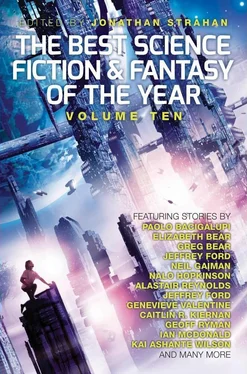WHEN I WASN’T with Thede, I walked. For two weeks I’d gone out walking every day. Up and down Arm Eight, and sometimes into other Arms. Through shantytowns large and small, huddled miserable agglomerations of recent arrivals and folks who even after a couple generations in Qaanaaq had not been able to scrape their way up from the fish-stinking ice-slippery bottom.
I looked for sex, sometimes. It had been so long. Relationships were tough in my line of work, and I’d never been interested in paying for it. Throughout my twenties I could usually find a woman for something brief and fun and free of commitment, but that stage of my life seemed to have ended.
I wondered why I hadn’t tried harder, to make it work with Lajla. I think a small but vocal and terrible part of me had been glad to see her leave. Fatherhood was hard work. So was being married. Paying rent on a tiny shitty apartment way out on Arm Seven, where we smelled like scorched cooking oil and diaper lotion all the time. Selfishly, I had been glad to be alone. And only now, getting to know this stranger who was once my son, did I see what sweet and fitting punishments the universe had up its sleeve for selfishness.
My time with Thede was wonderful, and horrible. We could talk at length about movies and music, and he actually seemed halfway interested in my stories about old New York, but whenever I tried to talk about life or school or girls or his future he reverted to grunts and monosyllables. Something huge and heavy stood between me and him, a moon eclipsing the sun of me. I knew him, top to bottom and body and soul, but he still had no idea who I really was. How I felt about him. I had no way to show him. No way to open his eyes, make him see how much I loved him, and how I was really a good guy who’d gotten a bad deal in life.
Cityoke, it turned out, was like karaoke, except instead of singing a song you visited a city. XHD footage projection onto all four walls; temperature control; short storylines that responded to your verbal decisions – even actual smells uncorked by machines from secret stashes of Beijing taxi-seat leather or Ho Chi Minh City incense or Portland coffeeshop sawdust. I went there often, hoping maybe to see him. To watch him, with his friends. See what he was when I wasn’t around. But cityoke was expensive, and I could never have afforded to actually go in. Once, standing around outside the New York booth when a crew walked out, I caught a whiff of the acrid ugly beautiful stink of the Port Authority Bus Terminal.
And then, eventually, I walked without any reason at all. Because pretty soon I wouldn’t be able to. Because I had done it. I had booked a twelvemonth job. I was out of money and couldn’t afford to rent my bed for another month. Thede’s mom could have given it to me. But what if she told him about it? He’d think of me as more of a useless moocher deadbeat dad than he already did. I couldn’t take that chance.
Three days before my ship was set to load up and launch, I went back to the cityoke arcades. Men lurked in doorways and between shacks. Soakers, mostly. Looking for marks; men to mug and drunks to tip into the sea. Late at night; too late for Thede to come carousing through. I’d called him earlier, but Lajla said he was stuck inside for the night, studying for a test in a class where he wasn’t doing well. I had hoped maybe he’d sneak out, meet some friends, head for the arcade.
And that’s when I saw it. The shirt: NEW YORK F CKING CITY, absolutely unique and unmistakable. Worn by a stranger, a muscular young man sitting on the stoop of a skiff moor. I didn’t get a good glimpse of his face, as I hurried past with my head turned away from him.
I waited, two buildings down. My heart was alive and racing in my chest. I drew in deep gulps of cold air and tried to keep from shouting from joy. Here was my chance. Here was how I could show Thede what I really was.
I stuck my head out, risked a glance. He sat there, waiting for who knows what. In profile I could see that the man was Asian. Almost certainly Chinese, in Qaanaaq – most other Asian nations had their own grid cities -- although perhaps he was descended from Asian-diaspora nationals of some other country. I could see his smile, hungry and cold.
At first I planned to confront him, ask how he came to be wearing my shirt, demand justice, beat him up and take it back. But that would be stupid. Unless I planned to kill him – and I didn’t – it was too easy to imagine him gunning for Thede if he knew he’d been attacked for the shirt. I’d have to jump him, rob and strip and soak him. I rooted through a trash bin, but found nothing. Three trash bins later I found a short metal pipe with Hindi graffiti scribbled along its length. The man was still there when I went back. He was waiting for something. I could wait longer. I pulled my hood up, yanked the drawstring to tighten it around my face.
Forty-five minutes passed that way. He hugged his knees to his chest, made himself small, tried to conserve body heat. His teeth chattered. Why was he wearing so little? But I was happy he was so stupid. Had he had a sweater or jacket on I’d never have seen the shirt. I’d never have had this chance.
Finally, he stood. Looked around sadly. Brushed off the seat of his pants. Turned to go. Stepped into the swing of my metal pipe, which struck him in the chest and knocked him back a step.
The shame came later. Then, there was just joy. The satisfaction of how the pipe struck flesh. Broke bone. I’d spent twenty years getting shitted on by this city, by this system, by the cold wind and the everywhere-ice, by the other workers who were smarter or stronger or spoke the language. For the first time since Thede was a baby, I felt like I was in control of something. Only when my victim finally passed out, and rolled over onto his back and the blue methane streetlamp showed me how young he was under the blood, could I stop myself.
I took the shirt. I took his pants. I rolled him into the water. I called the medteam for him from a coinphone a block away. He was still breathing. He was young, he was healthy. He’d be fine. The pants I would burn in a scrap furnace. The shirt I would give back to my son. I took the money from his wallet and dropped it into the sea, then threw the money in later. I wasn’t a thief. I was a good father. I said those sentences over and over, all the way home.
THEDE COULDN’T SEE me the next day. Lajla didn’t know where he was. So I got to spend the whole day imagining imminent arrest, the arrival of Swedish or Chinese police, footage of me on the telescrolls, my cleverness foiled by tech I didn’t know existed because I couldn’t read the newspapers. I packed my one bag glumly, put the rest of my things back in the storage cube and walked it to the facility. Every five seconds I looked over my shoulder and found only the same grit and filthy slush. Every time I looked at my watch, I winced at how little time I had left.
My fear of punishment was balanced out by how happy I was. I wrapped the shirt in three layers of wrapping paper and put it in a watertight shipping bag and tried to imagine his face. That shirt would change everything. His father would cease to be a savage jerk from an uncivilized land. This city would no longer be a cold and barren place where boys could beat him up and steal what mattered most to him with impunity. All the ways I had failed him would matter a little less.
Twelve months. I had tried to get out of the gig, now that I had the shirt and a new era of good relations with my son was upon me. But canceling would have cost me my accreditation with that work center, which would make finding another job almost impossible. A year away from Thede. I would tell him when I saw him. He’d be upset, but the shirt would make it easier.
Читать дальше












